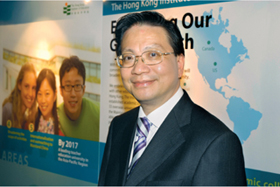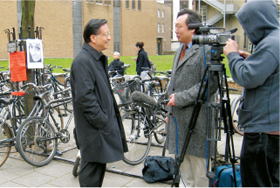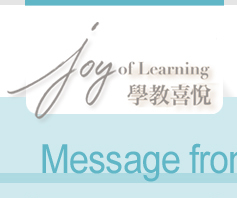 |
It gives me great pleasure to write my first Message as President for the Institute’s Joy of Learning magazine.

Since joining the HKIEd family, I have had many opportunities to meet students as well as our academic and administrative staff, both formally at forums and meetings, and in a more relaxed atmosphere at sharing
|
sessionsand breakfast meetings. Irrespective of the nature of our gatherings, a distinct message consistently arises – the unanimous wish to succeed in our quest for a university title. As a very new member at the Institute, I am in a position to view this aspiration with suitable objectivity. The HKIEd has come a long way to becoming a UGC-funded tertiary institution along withother universities. We now offerinnovative teacher education programmes at degree and postgraduate levels, with Master’s
and Doctoral Degree in Education. We emphasise teaching quality and the provision of total learning experience to our students. Our staff have become increasingly active in research, particularly applied research on education policy and practice. |
|
 |
| The President was pictured here interviewed by TVB’s Channel for Europe, when he expounded on HKIEd’s future plans. During the three-day visit to London, he also gave a public lecture on “Ten Years After Reunification – Hong Kong’s Governance and National Identity”, and hosted a reception attended by over 100 guests. |
|
|
In my view, the HKIEd has already in place a critical mass of academics, whose education specialisations and frontline experience are a tremendous asset to the community. Furthermore, 80 percent of Hong Kong’s primary school teachers have received their teacher education at the Institute or the former Colleges of Education. Building upon its achievements thus far, HKIEd is ready for moving to greater heights as a university of education which can lead in education development and innovation, not just in Hong Kong but also the wider Region. |
Fully convinced of this vision and HKIEd’s
mission, in my first email to staff and students on 2 January 2008, I expressed my commitment, mentioning that the quest for university title will top the list of my five
priority tasks.
Good intentions alone, however, will not bring us any closer to our target. Every individual at the Institute must play a part in communicating our goals and aspirations with regard to the Development Blueprint. Not only that, we must also continue to strengthen our academic capacity, and seek to become a centre of excellence in teaching and research, and extend our links in the international arena. I have recently visited the Institute of Education at the University of London, as well as the Faculty of Education of the University of Cambridge, and had very useful discussions on further institutional collaboration in research and postgraduate degree education. With the whole Institute community working in unison, and actively engaging different sectors and stakeholders, I am optimistic that the Institute will achieve, in good time, this major milestone in our development road map – the Hong Kong University of Education. |
|
 |
| At the Institute, our primary concern is to identify, both locally and beyond Hong Kong, young people whose aspirations are to either become teachers or to work in other professions where they can usefully apply their skills. When they are admitted, we see it as our mission to ensure that these students will benefit from their studies, and that they emerge as knowledgeable, caring and responsible educators and young people. By “empowering” our students, we help to transform the world around them. Each one of them can be an agent for change who inspires the next generation, just as our own school teachers had once inspired us.
Since the Institute began admitting
non-local students, mainly from the Mainland, in 2003-04, the relevant offices have placed diverse resources into helping these students settle in on campus. At the same time, they are given plenty of opportunities to see and get involved in our local culture and the many other cross-cultural experiences, which abound in Hong Kong. However what touches them most, according to the students, are the close teacher-student relationships and the strong mentorship culture, which are such distinctive features of the Institute.
Another Institute heritage is our long tradition of teacher education and the strong sense of continuity among our graduates. I am grateful that many of our alumni, some of whom professionally recognised through the Chief Executive’s Award for Teaching Excellence, have reciprocated the nurturing that they received at the Institute. They in turn have accepted our invitation to become teaching consultants to their juniors. We owe them a debt of gratitude both for their services and their help, which have enabled the Institute to win community recognition as one of Hong Kong’s leading education institutions. |
|
 |
| As an active institution in the tertiary education sector and a caring organisation, we constantly reach out to strengthen our relationships with the Tai Po community, the education community and the general public in Hong Kong. Fostering this spirit of community, we held a three-day Carnival in February 2008, with the active participation of schools, education groups, government departments, performing groups, voluntary organisations, as well as our alumni, staff and students. We also take it upon ourselves the mission to help promote the teaching profession and to preserve Hong Kong’s education heritage.
After three months at the Institute, I feel deeply impressed by the strong sense of belonging among staff, students and alumni, as shown, amongst others, in the three-day Carnival. Working together, I firmly believe that HKIEd will thrive in the years ahead. |
|
Anthony Cheung President |
|
|
|
 |


